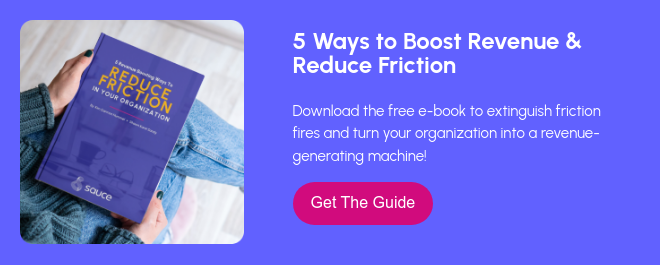Are You Leveraging the Power of Collaboration to Win Business?
Today’s blog tackles the last of the 4 Tenets of Modern Consumers: Collaboration. It didn’t take much to find a relevant example of why we demand this in our partnerships. This story is from this just past week:
Alright, STOP. Collaborate and Listen . . .
(If you chuckled here, I know you either had a mullet, mall bangs, hammer pants or all of the above in the 90’s)
Last week, one of our clients pushed the green light on a new web project and we were excited to kick it off and get things moving. As the client’s lead project manager for this new venture, our excitement quickly died.
After executing the contract, I received a half a dozen emails from their project managers—one I have never met or heard of—with instructions on how to create logins to their project management system. Ok, that’s no problem, I’m sure I’ll figure out who this guy is. Then two additional emails rolled in asking for information—both basic in nature and deeply abstract as well.
Much of the basic information was given in the discovery phase before we signed on and the abstract information would greatly impact the results and needed to be discussed, so I was left very confused and dismayed. Did they not document such simple, basic information? We wanted their expertise and input on those big questions but they want us to “try” filling in the blanks first?
I was also feeling that perhaps this team was not going to meet the expectations we had for a collaborative working partnership.
I was expecting to meet to discuss how the project would proceed, what the timeline would be, who would be my point of contact for XYZ and when I expressed this to the Account Executive, she informed me this is their standard procedure and meeting together happens after we start the project. And then I received 15 “assigned tasks” emails from their project management system—creating a calendar for the project that I noticed extends 7 weeks longer than their estimation of completion on the project.
Grrrrr . . . this is not a great start on my customer journey with this company. At this point, I’m questioning if we made the right choice and if I’ve risked my credibility with my client by putting my trust into this vendor. I’m also feeling more like an involuntary passenger, being dragged behind a tram on auto pilot. Certainly standardizing processes and bringing efficiencies to communication is a smart idea, however, standardizing customers is not a smart idea.
This can be turned around and fixed, certainly, but it’s always harder to turn something around than it is to start out on the right foot. Our world is highly customized now and there is a balance to strike between efficiencies and an impersonal approach.
What I wanted, what I expected, from this relationship was a collaborative relationship—a partner to help us reach our goals.
Collaboration before and during your relationship goes a long way to elevating trust with your customers—as well as colleagues, bosses—and when you elevate trust, you’re lowering the perception of risk. Risk is the heaviest factor when we make decisions. We weigh what are we risking when we try something new, buy something expensive, switch vendors, hire someone, et cetera?
4 Ways to Bring Collaboration to Your Partnerships to Increase Trust and Lower Risk
1. Be part of the total solution
Business, nor life, exists in a vacuum. Operating as if your product or service stands alone, independent in its use, purchased in a silo, is quite inconsiderate and short sighted. Much like solving the bigger problem, taking into consideration the other products, people and problems encountered upstream and downstream from where your customer connects with you gives you more opportunities to collaborate and customize your partnership.
This insight was particularly useful for me in the print industry—where quoting a price to print the contents for a 1” binder was much different than creating a flexible on-demand print system to update content and distribute it to 32 national locations by working with their marketing department and point of purchase vendor. I collaborated with the client as well as another vendor to understand and over come their challenges.
2. Share control and solve the bigger problems
Knowing that a client needs a website is much different than understanding how the website drives revenue opportunities do for their business. Contribute solutions that drive the big picture outcomes and approach your relationship as a partner to get to those results. By keeping focus on the bigger problem, you keep the customers’ objectives clear and at the forefront of your actions.
Clients (colleagues & bosses too) that feel they have input and participate in developing their own solutions feel more in control of the process and are more satisfied with the results. Working in step with your clients—they lead, you lead—to articulate and solve those problems builds strong and loyal working partnerships which lead to bigger projects and advocates for you and your business.
3. Ask and share insight and knowledge
Brilliant brands are leveraging customer collaboration at great competitive advantage. By reaching out to existing customers to get feedback on products, people and processes these brands are leveraging customer lead innovation, realizing strategic cost reductions and building brand loyalty with customers who are contributing to make their products and experiences better.
Many companies are also building customer driven communities where people discuss the products and share their insight with each other. These insights are “listened” to and great companies engage in these communities with real people—humanizing their brand and again, increasing trust and loyalty.
4. Bring more to the party —products, resources, and expertise
We’ve all encountered managers, sales people or customer service people with the mentality “Not my monkeys, not my circus.” You know that frustrating experience when you are trying to make a purchase or gain clarity on a decision and your point of contact is unconcerned about anything other than their job description.
Collaboration is the antithesis of apathetic attitude.
Being an advocate and consultant for your customers or constituents means you know when to reach beyond your own expertise and leverage other products, experience and resources.
How do You Leverage Collaboration with Colleagues, Customers, or Competitors?
Working with other departments, operational specialists, technicians, other vendors and even competitors—collaborating to bring more resources and expertise to your project, to your customers and to your results is a huge way to elevate trust and lower risk.
Because that is the key to winning people and building strong relationships—lowering risk when people invest in you. Collaboration, along with transparency, authenticity and responsiveness are all huge pieces of modern consumers trust equation.
.webp?width=12693&height=4513&name=Sauce%20Logo%20Dark%20Ht%20(1).webp)

.webp?width=180&height=64&name=Sauce%20Logo%20Dark%20Ht%20(1).webp)











